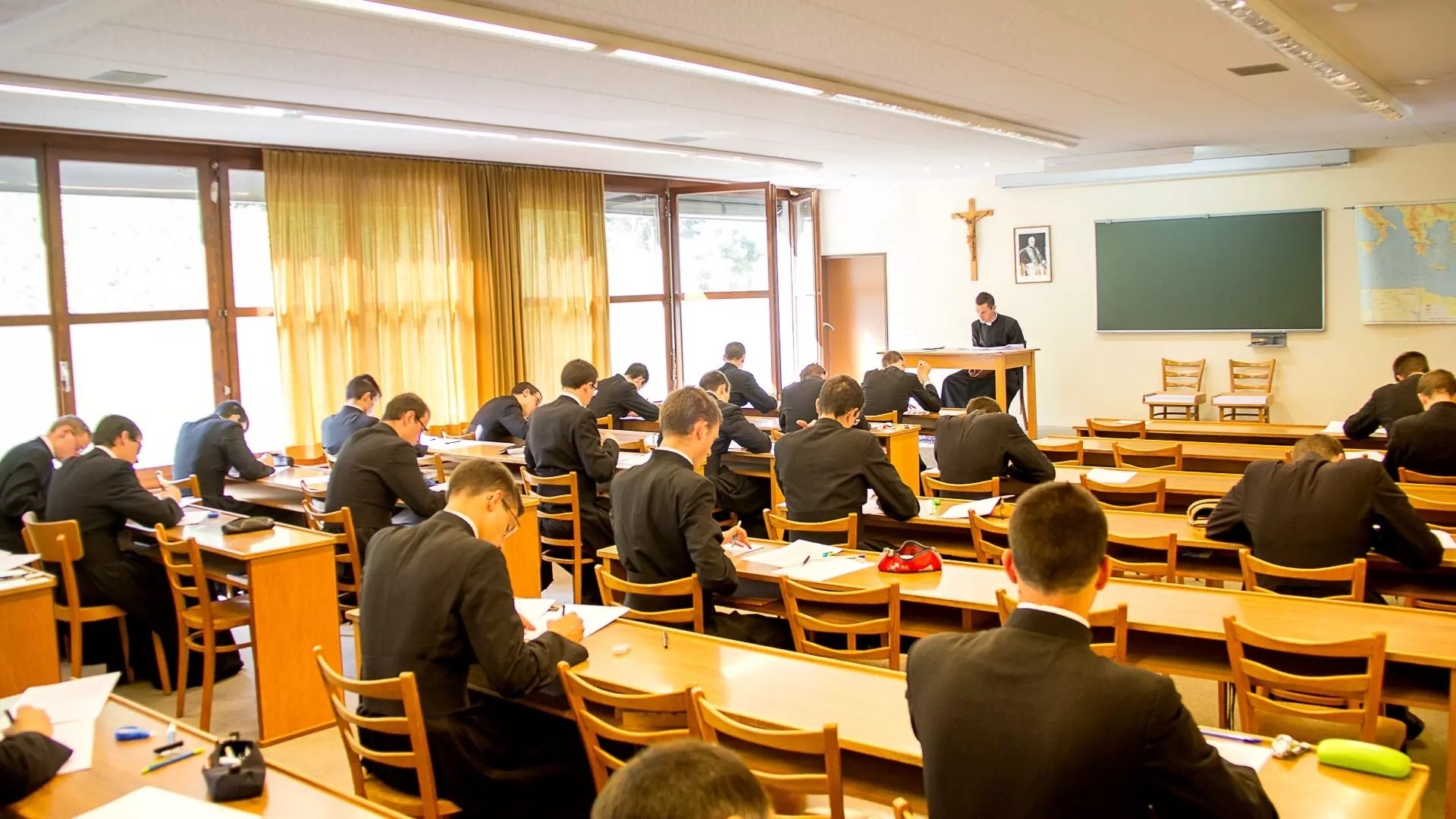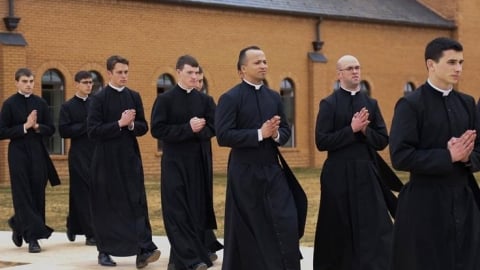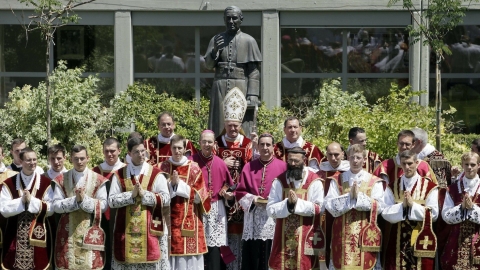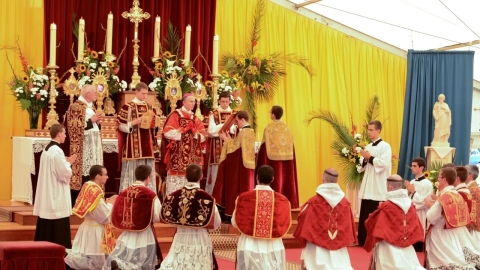A Seminarian's Day in Écône

Far from being a monotonous repetition, this rhythm that marks life in the seminary is the precious means to acquire a life of regular prayer. In the day of a seminarian, prayer is omnipresent, of course: in the chapel, before and after meals and classes, when there is time for an extra rosary, a Stations of the Cross, a spiritual communion—in all this, prayers are the punctuation marks of the seminarian's day.
Among the mountains of the Canton of Valais, at the Ecône Seminary, every morning the seminarian's alarm clock rings at six, and half an hour later the community gathers in the chapel where the sung Divine Office takes place, followed by twenty-five minutes of meditation and the Holy Mass, read during the week and sung on Sundays and holidays.
The day thus opens under the gaze of Our Lord, to whom belong the first fruits of the time and resources He has granted to each for a new day. After Holy Mass, at eight to remind the seminarians that even saints, however, have a body—the bell calls everyone to breakfast; it is consumed in silence, so that everyone can continue thanksgiving after Holy Communion and maintain recollection before the start of activities. Once breakfast is over, free time is given to everyone until nine, for the daily reading of Sacred Scriptures and a good spiritual book, an indispensable means to nourish the soul and keep it fervent.
From nine to noon, then, it is time for classes for the seminarians: these are taught in French by the seminary professors (all priests) in the two classrooms dedicated to the two years of philosophy and in the theology classroom. The ecclesiastical studies program involves various subjects which, over the course of the five years at Ecône, will gradually deepen the seminarian's knowledge of Our Lord Jesus Christ and foster a lively desire for common good towards others.
Subsequently, at quarter past noon, the community gathers again in the chapel for the singing of another part of the Divine Office, after which lunch is served. After lunch, until two, recreation offers an excellent opportunity to take a breath of fresh air and be in serene and joyful company. Once recreation is over, thanks to a brief visit to the Blessed Sacrament, each seminarian returns to the feet of Our Lord to place the morning passed in His hands and entrust to Him the afternoon to come.
There are several activities that can find space in the afternoon: first and foremost is studying, for which everyone has access to, in addition to the material provided by the professors, the well-stocked seminary library (with over 43,000 books!); on Wednesdays and Sundays, then, there is free time to go out and play sports, take walks, visit the surroundings, etc...; on Tuesdays and especially Saturdays, finally, space is given to tasks to be carried out in the service to which one is assigned during the seminar (garden, sacristy, ceremonies, organ, library, binding...). In the mid-afternoon, at four, activities are interrupted for a snack, an important moment to replenish physical energy, and then resume afterward. In the late afternoon, several times a week, half an hour is dedicated to Gregorian chant, either to acquire greater knowledge and mastery or to prepare for upcoming sung masses. Every day, moreover, at half-past six, a spiritual conference for everyone is held by the director. After that, once again, the community gathers in the chapel to pray the rosary for the intentions of the friends and benefactors of the seminary; on Thursdays and Sundays, the Eucharistic blessing takes the place of the rosary.
Dinner is served at seven-thirty. Like lunch, much of the meal is taken in silence on weekdays; but while at lunch a spiritual reading is read, the life of a saint, an article, the story of a mission, etc... at dinner, instead, the homilies and conferences of Msgr. Lefebvre are listened to, collected in their entirety (which at the Francophone seminary of Ecône one has the grace to listen to in the original language and voice!). After dinner, forty minutes of recreation leave space for evening entertainment, to walk, chat, or play together.
The day, finally, ends with Compline, the evening prayer of the Church that the community sings in the chapel at quarter to eight. At the end of Compline, the great silence of the evening begins: everyone is free to stay in the chapel for a moment, go down to the crypt to pray for a moment at the tomb of "Monsignor"... and then return to their rooms and turn off the light by ten o'clock. The next day, everyone will wake up at six; a new day will begin, and the rhythm of the seminary will resume its course... if the Lord so wills...
TO DEDICATE EVERY MINUTE TO OUR LORD
Far from being a monotonous repetition, this rhythm that marks life in the seminary is the precious means to acquire a life of regular prayer. In the day of a seminarian, prayer is omnipresent, of course: in the chapel, before and after meals and classes, when there is time for an extra rosary, a Stations of the Cross, a spiritual communion—in all this, prayers are the punctuation marks of the seminarian's day. But continuous prayer, whether public or private, is limited in time: however short or long it may be, sooner or later it will end, and the seminarian will return to his studies, his duties, and his daily services.
In the regular succession of activities lies the possibility of continuing this prayer, so that one's day becomes a single, great prayer. Like offering every action to God throughout the day, no matter how trivial, so that each action is not an end in itself but allows us to remain united with God and live in His presence at every moment. The brief prayers before and after each activity serve the purpose of renewing this supernatural intention, which tends to be swallowed up by the many occupations of the day.
By taking care to renew these small offerings in every activity, the seminarian's day thus becomes a continuous prayer, and at every moment gives glory to God, wins graces for souls, and merits eternal life.
Source: Bollettino del Priorato Madonna di Loreto (FSSPX), Agosto 2023





